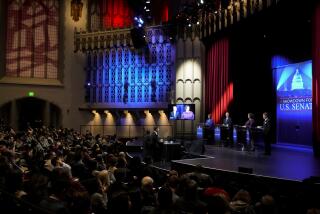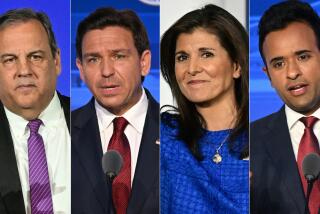Dukakis Seizes Initiative in Iowa Debate With Gephardt
- Share via
DES MOINES — Massachusetts Gov. Michael S. Dukakis seized the initiative during a Democratic presidential campaign debate with Missouri Rep. Richard A. Gephardt here Saturday by attacking Gephardt’s legislative record on trade, taxes and defense.
In an hourlong confrontation that was televised live to New Hampshire, the critical first presidential primary state, Dukakis also used the opportunity to contrast his own executive experience as a governor with Gephardt’s background as a lawmaker.
“You want a law, I want to act,” he told Gephardt as he asserted that Gephardt’s proposal to require the President to retaliate against nations engaging in unfair trading practices is not necessary.
‘Don’t Need Gimmicks’
“The President today has all the authority he needs,” Dukakis said. “We don’t need more laws and more gimmicks. We need a President who is tough enough, smart enough and experienced enough.”
Although the official start of the presidential campaign is about six months away, the confrontation represented an important test for both candidates. It was the first one-on-one confrontation between Democratic presidential contenders, and both participants are considered to be in the front rank among Democratic rivals. Dukakis is leading in polls in New Hampshire and Gephardt is widely perceived to be the front-runner in Iowa, where the national Democratic delegate selection process begins next February.
Dukakis’ aggressive tactics during the encounter at Drake University were all the more striking because it was Gephardt who had instigated the debate by criticizing Dukakis’ views on trade and his claims about his record as Massachusetts governor after the nationally televised debate among Democratic presidential candidates in Houston last month.
Briefly and Mildly
But Gephardt brought up Dukakis’ gubernatorial performance--which the governor has made central to his claim that he can increase economic opportunity for Americans in the other 49 states--only briefly and mildly at the beginning of the debate.
“Massachusetts isn’t America,” Gephardt said, contending that the economy of the state, where last week unemployment was reported to have dropped to 2.5%, had greatly benefited from more than its share of defense spending. “The issue isn’t the Massachusetts miracle,” he said. “It’s whether we can create an American miracle that will bring us better jobs and growth.”
One Gephardt adviser who did not want to be identified said the congressman had shied away from a more direct challenge to Dukakis because he was leery that he might seem negative and divisive.
A Height Disadvantage
Wearing dark suits and red ties, the two rivals stood behind lecterns a few feet apart with Dukakis, who is about three or four inches shorter than Gephardt, using a platform to offset his height disadvantage.
Both candidates seemed poised and prepared. But Dukakis, perhaps because of his greater television experience--he was host of the public television program “The Advocates” between gubernatorial terms--seemed more self-assured.
Besides renewing his attack on Gephardt’s trade proposals as unnecessary and his call for an oil import fee as costly to farmers and consumers, the governor also launched a new assault by bringing up the congressman’s vote in favor of the sweeping 1981 cut in income taxes that was the linchpin of President Reagan’s economic program.
Terms Cut a Disaster
Dukakis called the tax cut a “government-made disaster” that by vastly increasing the federal budget deficit had driven up the value of the dollar and thus greatly contributed to the huge U.S. trade deficit, which Gephardt has sought to make one of the major issues of his campaign.
In response, Gephardt said he had originally opposed the Reagan tax cut, and had fought for some Democratic alternative but had voted for it because it was the only tax cut proposal on the legislative docket. He challenged Dukakis to say whether he would vote to repeal the tax cut, a question Dukakis did not answer.
Dukakis also criticized Gephardt for his votes to support funding for the MX missile, the neutron bomb, the B-1 bomber, nerve gas, and against deep cuts in spending for Reagan’s proposed Strategic Defense Initiative, asking whether those votes reflected his overall attitude toward defense spending.
Prodding the Soviets
Gephardt said the votes, some of which went back to the Jimmy Carter presidency, had been cast because, at the time, he felt they helped strengthen U.S. security or to prod the Soviet Union to negotiate weapons cutbacks. He said that in the case of some weapons systems, such as the MX and nerve gas, he had on other occasions voted against funding increases.
Seeking the offensive, Gephardt challenged Dukakis to state his position on the farm legislation co-sponsored by Gephardt and Sen. Tom Harkin (D-Iowa) that eases credit for farmers and provides for production controls to boost farm prices. Dukakis said he was uncertain of his position on the bill because he feared the production controls might boost prices to the point where it would hurt agricultural exports.
After the debate, Iowa Atty. Gen. Tom Miller, chairman of former Arizona Gov. Bruce Babbitt’s presidential campaigning in the state, said Dukakis had the advantage because “he sounded like a chief executive and Gephardt sounded like a legislator.”
But Jim Pribyl, a lobbyist for Northwestern Bell Telephone Co. and an activist but uncommitted Democrat, thought Gephardt had the better of the encounter. “He offered a clear message in response to Dukakis’ attacks,” Pribyl said.
In the end, both sides claimed victory of sorts. Gephardt’s advisers saw the session as increasing their candidate’s exposure in New Hampshire. Dukakis’ strategists claimed the event would help their man in Iowa, where he is not as well known as Gephardt and where the debate will be shown today on cable television.
More to Read
Get the L.A. Times Politics newsletter
Deeply reported insights into legislation, politics and policy from Sacramento, Washington and beyond. In your inbox twice per week.
You may occasionally receive promotional content from the Los Angeles Times.










